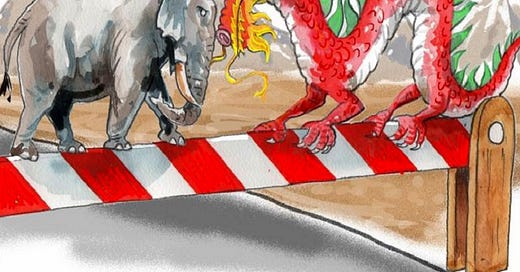China Harshly Condemned The Indian Home Minister’s Visit To Disputed Himalayan Territory
This latest development escalates the rhetoric between them because it’s no small matter that China just accused India of violating its territorial sovereignty.
Indian Home Minister Amit Shah’s visit to the Delhi-controlled disputed Himalayan territory of Arunachal Pradesh, which China calls South Tibet, prompted a harsh condemnation from Beijing. Foreign Ministry spokesman Wang Wenbin declared that “Zangnan is China's territory. The Indian official's visit to Zangnan violates China's territorial sovereignty, and is not conducive to the peace and tranquility of the border situation.” This shortly follows China’s recent renaming of some Indian-controlled areas.
Over the past week, Sino-Indo ties continued to worsen as a result of the seemingly tit-for-tat visa issues with each other’s journalists, after which reports started circulating on Friday alleging that China planned to obtain intelligence about India from facilities in Myanmar and Sri Lanka. This latest development escalates the rhetoric between them because it’s no small matter that Beijing just accused Delhi of violating its territorial sovereignty.
The People’s Republic previously remained mum after India hosted a G20 meeting in this disputed territory late last month, which reports indicate China skipped and might in hindsight have influenced its decision to rename some of these Indian-controlled areas over a week later. It previously protested prior visits by Indian officials to that region, but the context in which their latest one was made suggests that ties are fated to proceed along their presently downward trajectory for the indefinite future.
Neither side is expected to back down from their respective claims to this Himalayan territory: China’s form an integral part of its national story related to reversing the Century of Humiliation while India’s are connected with its decades-long continued control over the region. This dynamic won’t just negatively affect their bilateral ties, but could also impede multilateral cooperation in BRICS and the SCO, especially concerning the first-mentioned’s new (and possibly digital) reserve currency plans.
Nevertheless, both claimants will likely do their utmost to responsibly manage the military dimension of their growing tensions so as to prevent the outbreak of a conflict by miscalculation that could subsequently be exploited by the US to divide-and-rule them. Russia could also play a positive role in the event that it’s requested to mediate by its fellow multipolar partners, though each of them would have to ask for this since Moscow won’t do so unilaterally if one of them hasn’t expressed interest in it.
It's crucial that Sino-Indo tensions remain manageable in the near term at least since the speculative scenario of China skipping the upcoming Indian-hosted SCO and G20 Summits as a form of protest in the event that their ties seriously deteriorate before then would deal a heavy blow to multipolarity. To be absolutely clear so as not to have the preceding sentence misunderstood or the intention behind it spun by propagandists, it’s unlikely that China would do this, but it also can’t be ruled out either.
Rather, observers should remain cognizant of this scenario since it represents the worst-case one that could unfold across the next five months leading up to the G20 Summit in early September. More than likely, however, the Sino-Indo rivalry won’t escalate so dramatically before then that this becomes a viable possibility since it would be mutually disadvantageous if that happened. As long as there aren’t any serious clashes along their disputed frontier, then this scenario almost certainly won’t materialize.
That said, the takeaway from this latest update on the downward trend in Sino-Indo relations is that China’s rhetoric was significantly escalated in response to the Indian Home Minister’s visit to this disputed Himalayan territory. This is a concerning development that deserves to be closely monitored by interested observers because of the chances – however slim for now – that it could lead to much more significant military and/or political escalations by either side before September’s G20 Summit in Delhi.




